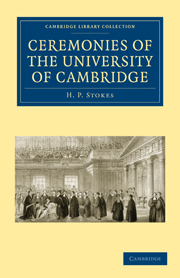Book contents
- Frontmatter
- Prefatory Note
- Contents
- ILLUSTRATIONS
- The Chancellor
- The Vice-Chancellor
- The Registrary
- The Proctors
- The Esquire Bedells
- Matriculation
- Congregations and Graces
- Degrees
- Commencement Day
- Insignia Doctoralia
- Honorary Degrees
- University Costume
- Processions
- The Presentation of an Address to H.M. The King
- The Bidding Prayer
- University Sermons
- The Orator
- The High Steward
- Representation in Parliament
- The Commissary
- University Discipline; the Sex Viri, etc.
- H.M. Judges and Trinity College
- The Admission of the newly elected Master of Trinity
- Commemoration of Benefactors
- The University and College Chests
- Obsolete Officers
- The University and Stourbridge Fair
- The University Arms
- The University Motto
- Index
- Plate section
- Frontmatter
- Prefatory Note
- Contents
- ILLUSTRATIONS
- The Chancellor
- The Vice-Chancellor
- The Registrary
- The Proctors
- The Esquire Bedells
- Matriculation
- Congregations and Graces
- Degrees
- Commencement Day
- Insignia Doctoralia
- Honorary Degrees
- University Costume
- Processions
- The Presentation of an Address to H.M. The King
- The Bidding Prayer
- University Sermons
- The Orator
- The High Steward
- Representation in Parliament
- The Commissary
- University Discipline; the Sex Viri, etc.
- H.M. Judges and Trinity College
- The Admission of the newly elected Master of Trinity
- Commemoration of Benefactors
- The University and College Chests
- Obsolete Officers
- The University and Stourbridge Fair
- The University Arms
- The University Motto
- Index
- Plate section
Summary
No one (it is stated in the New Statutes) shall be matriculated unless he is presented by a College, or has been approved as a Non-Collegiate Student; and is qualified in certain ways, such as, by having been approved as a Research Student, or as an Affiliated Student, etc. etc. (see Statute B).
The University may determine by Ordinance the manner of matriculation (see B.1.2).
Dr Venn, in the Introduction to his volume, the Book of Matriculations and Degrees, has an interesting section on the old Matriculation Register. He says that by the statute of 1544 every student was required to matriculate soon after commencing residence, but the names of many students who certainly entered at a College and came into actual residence are not recorded. Sometimes the omission was due to the youth of the student. Again fellow-commoners, and other young men of family, who seldom contemplated taking a degree, often neglected to present themselves to the Registrary–Oliver Cromwell is a signal instance in point; but in the case of those who graduated, there are not a few cases where no matriculation is on record.
In other cases, matriculation was delayed till just before graduation. Lord Byron, for instance (probably from financial reasons), did not matriculate till the same day (4 July 1808) on which he was presented for his M.A. degree.
- Type
- Chapter
- Information
- Ceremonies of the University of Cambridge , pp. 25 - 26Publisher: Cambridge University PressPrint publication year: 2009First published in: 1927

